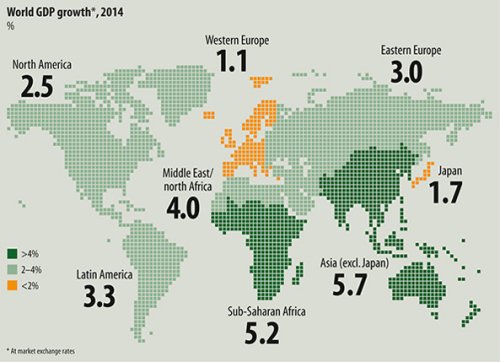Laos Named As One Of The World’s Fastest Growing Economies
Laos has been named as one of the top 10 fastest growing economies in the world, according to a well respected economic forecasting organisation.
The Economist Intelligence Unit has released its projections for economic growth in 2014, forecasting that the Lao economy will see 8.5 percent growth this year, which should put it among the top 10 fastest growing economies in the world.
According to the Washington Post, a leading newspaper in the United States, which published the projections earlier this month, the other fastest growing economies in 2014 are Mongolia, which is projected to see 15.3 percent growth, Sierra Leone, which will see 11.2 percent growth, Turkmenistan, which will experience 9.2 percent growth and Bhutan, which is projected to see 8.8 percent growth.
Meanwhile Libya should experience economic growth of 8.8 percent, Iraq should see economic growth of 8.5 percent, Timor-Leste is projected to see 8.5 percent growth, Eritrea 8.0 percent growth and Zambia 7.9 percent growth.
The newspaper said one of the main factors making these countries the fastest growing economies in the world is the exploitation of natural resources. Most of these nations export large quantities of natural resources, mainly mineral commodities, to other developing nations.
According to international financial institutions including the Asian Development Bank and the World Bank, the Lao economy has seen remarkable growth over the past five years due to the export of natural resources including mining, rising investment and hydropower output.
These institutions have urged Laos to diversify its economy if it wishes to sustain economic growth in the longer term as the export of natural resources will one day be depleted.
Lao policy makers said no countries in the world see success in development without using natural resources as an initial development stimulus, pointing out countries like the US and Canada also used funds from natural resources to develop other sectors, in particular education.
They said Laos is aware of its use of natural resources and has a policy to boost the development of small and medium size enterprises (SMEs) to sustain longer term economic growth.
The government is also allocating more funding to education in order to develop the skills of the labour force and meet growing demand.
One of the key challenges for Laos to secure sustainable economic growth is that the government must ensure strong political commitment and take action to implement its policies – in particular the creation of a sound business and investment climate and the promotion of private investment in the non-resource sector.
To this end, the government has established a policy bank which aims to provide low interest loans for agricultural businesses in poor districts as part of efforts to reduce poverty in the country.
However, one of the challenges is that despite the growth of the commercial banks, SMEs are still struggling to access investment funds due to the complexity of the money lending process.
Source: Vientiane Times

